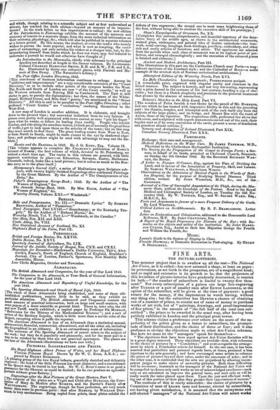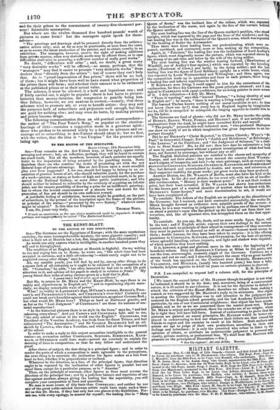FINE ARTS.
THE PICTURE-LOTTERIES.
THE monster project that is to swallow up all the rest—The National Art-Union, as it is called—has now assumed a shape, at least on paper : its pretensions, as set forth in the prospectus, are of a magnificent kind; and so rapid and extensive is its growth to be, that the projectors of this leviathan of picture-lotteries have prudently determined, to restrict its bulk—" the number of subscribers is limited to twenty-five thou- sand." For every subscription of a guinea one large line-engraving after TURNER or a pair of' smaller ones after Envitir LANDSEER, at the option of the subscriber, will be given at the time of payment: a good return for the money, if the impressions be worth having, without any thing else; but the subscriber has likewise a chance of obtaining one of a number of prizes, to consist not of sums of money to purchase works of art with, but of "paintings, drawings, and proof-impressions of fine prints," to the amount of " the full half of the total sum sub- scribed"; the prizes to be awarded in the usual way, after having been publicly exhibited in London and the principal great towns. This scheme claims a preference over others on the score of the su- periority of the prints given as a bonus to subscribers, the prompti- tude of their distribution, and the choice of three or four ; and it also professes to obviate the objections made to other Art-Union schemes. But here we must let the " managers" speak for themselves- " The objections that have been urged against Art-Union Societies will be in a great degree removed. These objections are twofold—first, with reference to the choice of pictures by a "Committee;" and next as regards the arrange- ment by which a Prizeholder selects for himself. In the one case, it has been asserted that partialities and personal regards have, at times, produced a bias injurious to the arts generally ; and have encouraged some artists to enhance the prices of pictures beyond their value, under the assurance of sales ; and in the other case, it is contended that the arts are prejudiced by allowing incom- petent judges to make choice of unworthy pictures. Both these difficulties will be overcome ; inasmuch as the managers of the National Art Union will be compelled to choose only such works as are of acknowledged excellence—such only as are calculated to improve the general taste, and such only as will be really worth the value placed upon them. Upon the just and effectual work- ing out of this portion of their plan they ground their expectations of success." The coolness of this is really admirable: the choice of pictures by a Committee of men of known taste and honour, elected by subscribers, not having given satisfaction, it is assumed that the anonymous and self-elected "managers" of the National Art-Union will select works
and fix their prices to the contentment of twenty-five-thousand per- sons! Inimitable assumption.
But where are the twelve thousand five hundred pounds' worth of pictures to come from ? Let the managers again speak for them- selves- "The paintings and drawings shall be procured directly from the artists- native artists only ; and, as far as may be practicable, at once from the easel, BO as to secure the latest production of the painter, and to obtain novelty in an exhibition. The managers, however, reserve the right of making additions from private sources, when very desirable works may be offered them, or in case difficulties shall arise in procuring a sufficient number of really good works." No doubt, "difficulties will arise " ; and, no doubt, a great many "very desirable works" will be offered,-so many, perhaps, that the " managers " may find it easier to procure "very desirable works" from dealers than "directly from the artists " : but of course they can't help that. As to "proof-impressions of fine prints," there will be no lack of them ; but it might have been well to have stated what proportion of the prizes these will form ; and whether their amount is to be estimated at the published prices or at their actual value.
The scheme, it must be allowed, is a bold and ingenious one ; and if fairly carried out, it might be popular : there is less harm in picture- lotteries than money-lotteries, the temptation to gamble being less. One fallacy, however, we are anxious to correct,-namely, that these schemes tend to promote art, or even to benefit artists : they may suit the purposes both of subscribers and projectors well enough, but they are good for nothing else; and may even do harm, by making pictures and prints become drugs.
The following communication from an old poetical correspondent- the author of "The Poor Voter's Song," so popular on the election- hustings of 1835-contains a suggestion made in a generous spirit : those who profess to be actuated solely by a desire to advance and en- courage art in subscribing to Art-Unions should adopt it ; but we fear, with the writer, that the idea is "too Utopian" for the present calcu- lating age.
TO THE EDITOR Or THE SPECTATOR.
Boyne Cottage, 151h November 1842.
SIR -Y our remarks on the Art••Unions may, at first sight, appear rather sweeping and severe; but, on reflection, perhaps, they will be found to contain too much truth. Not all the members, however, of such societies are equally liable to the imputation of being actuated by the gambling mania. Some doubtless there are who combine the desire of promoting art with the not illeberal hope of private advantage. Has an Art-Union upon a more unselfish plan ever been suggested ? 1, for one, should feel happy to belong to an as- sociation of genuine lovers of art, who should subscribe yearly for the purchase of a work-picture, or statue, or both-of high and undoubted merit, to be pre- sented to the National Gallery, or some other public institution ; and who should neither be induced to subscribe by the certainty of acquiring an inferior print, nor the remote possibility of drawing a prize for an indifferent painting; but to whom the inward consciousness of a sincere love and desire for the promotion of fine art should be its own sufficient reward. A justifiable feeling of satisfaction, however, might be gratified, on the part of subscribers, by the perusal of the inscription upon the frame of the picture, or pedestal of the statue-" presented by the — Society," whatever name might be adopted.* Is this idea too Utopian?
am, Sir, yours very truly, THOMAS NOEL.
• If such an association as the one abose mentioned could be organized, it might, perhaps, not inappropriately be called "The ./Esthetical Society."



























 Previous page
Previous page